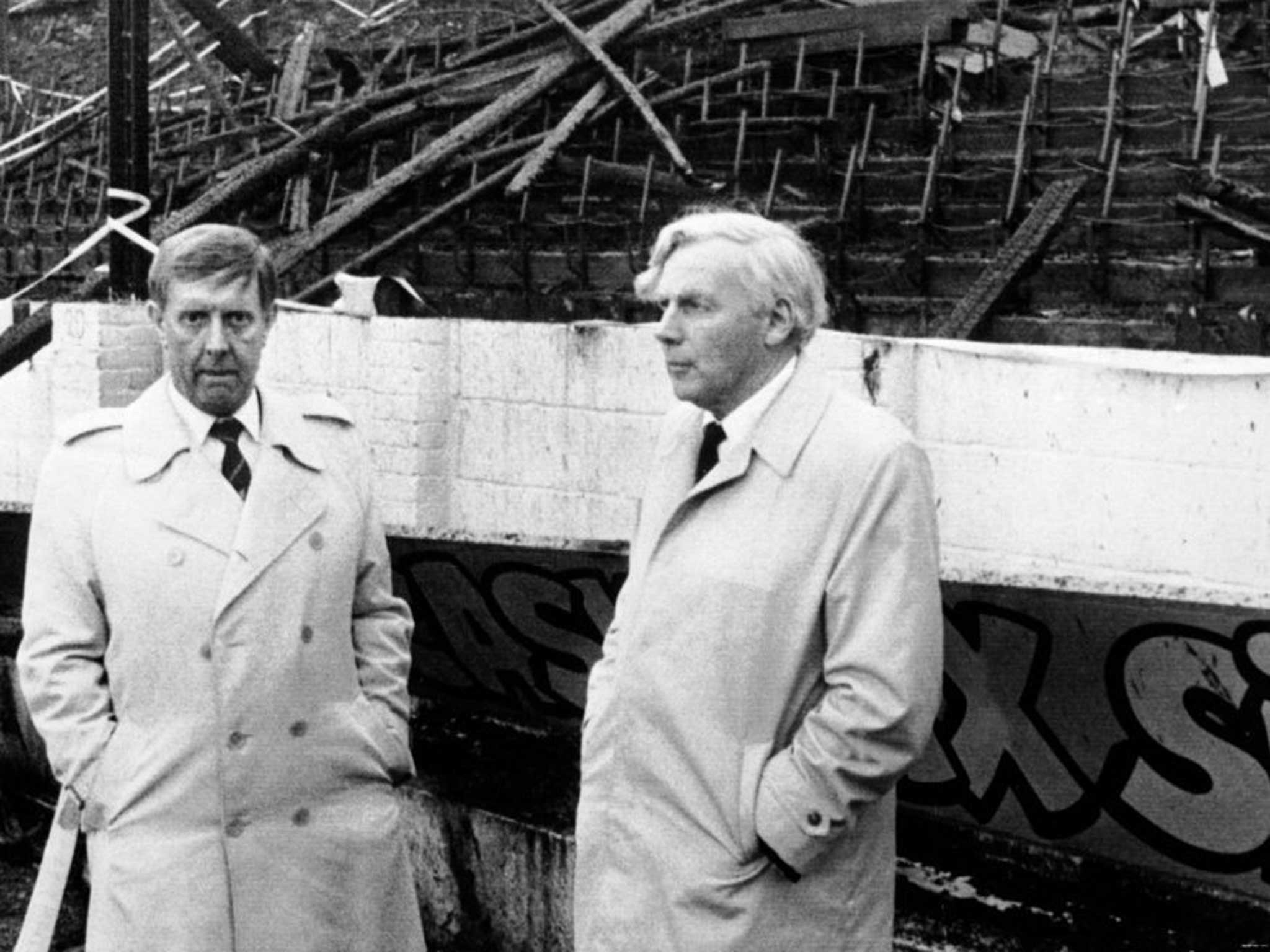Bradford City stadium fire: Claims the disaster was started deliberately 'nonsense', according to High Court judge
Tom Peck analyses the many questions raised by the sensational new evidence

The High Court judge who led the inquiry into the Bradford City stadium fire of 1985 has rejected the idea that it could have been started deliberately as “nonsense” but called for further investigation.
Sir Oliver Popplewell said that sensational new evidence compiled by a survivor – which links the club chairman at the time, Stafford Heginbotham, with a further eight fires in years prior to the disaster – should be examined. He added that he would have looked into the previous fires himself, had he known about them.
“I think it is important from a public point of view that the police look at the other fires and see if there was anything sinister. It is a remarkable number,” he said yesterday. “I think it’s important to satisfy people’s minds that the other fires are unconnected.”
Det Supt Mark Ridley, of the homicide and major inquiry team at West Yorkshire Police, later said: “The jury at the inquest in 1985 delivered a verdict of misadventure. [But] should any evidence come to light which was not available to Her Majesty’s Coroner at the original inquest, then we will consider its significance and take appropriate action.”
At this stage, though, even the implication that the disaster, and the 56 lives lost, could have been caused by anything sinister appears to ask far more questions than it answers.
Why has this only come to light now?
Martin Fletcher, who survived the fire as a 12-year-old boy but whose brother, father, uncle and grandfather were killed, has spent years sifting through local newspaper cuttings dating back to more than 20 years before the fire. He has now published a book of his findings. It is Fletcher who has found evidence, all of it already in the public domain, of fires at businesses owned or associated with the then Bradford City chairman Stafford Heginbotham, who died in 1995. The earliest incident was in 1967.
Why wasn’t this evidence put before the inquiry at the time?
An inquiry into the fire was held by Sir Oliver, but it concluded just weeks after the 1985 disaster, and heard just five days of evidence. He stands by the conclusion of his inquiry, which heard from police experts who found no evidence of arson, and that it was “an accident exacerbated by negligence”.
What was the negligence?
Investigators found a large build up of litter under the stand, including a copy of a local newspaper dated 1968, suggesting the area had not been cleared for 20 years or more, leading to the fire spreading more quickly than it might have done otherwise. There were also suggestions that the club had ignored warnings from Fire Safety inspectors, but these facts do not intimate the fire may have been caused deliberately.
Why was the original investigation concluded so quickly?
Given what is now known about the original inquiry into the Hillsborough stadium disaster – in which police were later revealed to have given false accounts of the crush that killed 96 people in 1989 – it is not unfair to claim that matters pertaining to football were not considered with the same importance they would be now. After all, the Popplewell Inquiry also looked into the death of a fan in a football riot in Birmingham, as if these two matters – terrace violence and a fatal fire – can be conflated.
Bradford was not considered particularly complicated. It was, it appeared, simply a tragic accident. Sir Oliver Popplewell’s letter to The Times in 2011, regarding another inquiry into Hillsborough being established – the one that would finally reveal the truth about that disaster – is also instructive.
“The citizens of Bradford behaved with quiet dignity and great courage. They did not harbour conspiracy theories. They did not seek endless further inquiries,” he wrote. “They buried their dead, comforted the bereaved and succoured the injured. They organised a sensible compensation scheme and moved on. Is there, perhaps, a lesson there for the Hillsborough campaigners?”
Could it really have been deliberate?
Martin Fletcher’s book claims Mr Heginbotham was in dire financial difficulty before the fire occurred, and had also been informed it would cost £2m to improve the ground to the standard required for promotion into the Second Division (now known as the Championship), which the club had just achieved.
The book claims that Bradford City received around £988,000 in insurance and other payouts, as well as a gift of £1.46m from the local authority.
But in dismissing the idea of arson as “nonsense”, Sir Oliver said the stand had been condemned, was due for demolition and had no insurance value.
Even if the West Yorkshire police do investigate the previous eight fires for evidence of “anything sinister”, it cannot be ignored that none of those fires led to injury or fatality. From there, to a deliberate blaze in a stand packed full of football fans, is a giant leap in criminality.
What will happen now?
The Shadow Health Secretary and noted Hillsborough campaigner, Andy Burnham, has called for a fresh investigation, saying the original inquiry was “conducted with undue haste”. But while West Yorkshire Police have said the force would consider any new evidence concerning the fire, only the Home Secretary can set up a new full public inquiry – and who knows who will be in that post after the election?
